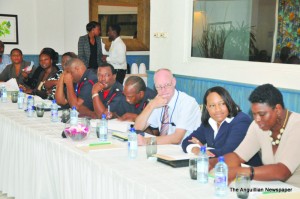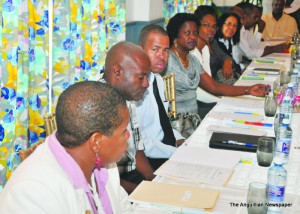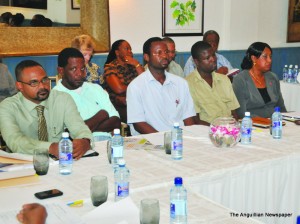
Public sector workers, drawn from various Ministries and Departments, turned out in large numbers on Tuesday, May 8, for a one-day Government of Anguilla Business Continuity Workshop. The event, hosted and sponsored by CuisinArt Golf Resort and Spa, had as its theme: “Establishing a framework to build resilience and effective response and recovery to major workplace incidents.”
Director of Disaster Management, Melissa Meade, defined Business Continuity as “an activity performed by organisations to maintain service, consistency and recoverability of critical business functions to customers, suppliers, regulators, and other entities, that must have access to those functions.”

She made the point that Business Continuity was not something implemented at the time of a disaster, but a plan to prepare persons for any event such as a hurricane, power outage or office flood, and thereby improve effectiveness and efficiency within the Government service.
Deputy Governor Stanley Reid, then Acting Governor, noted that previously Business Continuity Workshops were held for private sector organisations. “I think we will accept that despite the best efforts of the private sector, if the Anguilla Public Service is unable after a disaster event to offer its various services, private sector entities will be adversely affected,” he observed.

Mr. Reid continued: “A Business Continuity Plan is a tool which, when used effectively, allows establishments to not only moderate risk, but to also continuously deliver products and services despite disruption. This is an ideal that we must strive for in the Anguilla Public Service. Consider the implications of not being able to offer customs, immigration or postal services to our customers. How would our inability to issue permits and licences affect the ability of individuals and organisations, in the private sector, to offer services and products to their customers? What hardships will be brought to bear on those who rely on our social services if those services are interrupted?”

He pointed out that while a Business Continuity Plan was necessary, it was not enough. “Following the creation of the plan, we must engage in regular training as this is an essential part of ensuring the effectiveness of a Business Continuity Plan,” he went on. “Staff members must be briefed on the contents of the Business Continuity Plan and must be aware of their individual responsibilities. The effectiveness of training must then be tested by the execution of exercises. Areas such as relevance and effectiveness must be tested, refined and improved.
Mr. Reid stated that the workshop was expected to heighten awareness of the need to improve preparedness levels for anticipated and un-anticipated events. “This heightened awareness is expected to result in focused attention on the creation and delivery of Business Continuity Plans. I therefore commend all those who have been involved in the organisation and delivery of this workshop, and those previously held for the private sector. Cleary the cooperation we are seeking to engender, between the Government, Government Agencies, NGOs and private sector organisations, should result in great things,” he added.
Permanent Secretary, Public Administration, Mrs. Kathleen Rogers, said the workshop was timely as there was a need to be able to plan for any situation and any event. “As we approach the hurricane season, we need to be prepared,” she stressed. “However, not only hurricanes can prove to be disastrous. We need to plan for, and protect ourselves from, other crises such as fire, earthquakes, floods, theft and IT failure, just to name a few. Let us also not forget that health hazards can prove to be very disastrous if a number of our staff is affected at the same time such as a pandemic flu. We feel the effects even if there is one staff member sick…” She pointed out that “unexpected non-availability of key workers can be just as catastrophic as a technological failure to an organisation, especially if the unavailability occurs during a busy period. If only one person is trained to do a particular or essential task, his or her unexpected absence can severely affect productivity.”
The Permanent Secretary called on all workers to ensure that a plan was in place for all departments and the public service in general.“A carefully thought out Business Continuity Plan will make coping in a crisis easier, and enable us to minimise disruption to the services we provide to the customers,” Mrs. Rogers emphasised.
“As part of the planning process, we should be able to identify potential crises that could affect the workplace and the workforce; determine how the risks from these disasters or crises can be minimized; set up all the necessary steps that should be taken in the event of a disaster in a Business Continuity Plan. When the plan is developed, it should be tested regularly including the training of staff.”
Mrs. Rogers believed that a safety officer for each department was appropriate and should be taken seriously. “The officers identified should consider their role to be just as important as any other task assigned,” she added.“As a result, the officer should be very excited about this workshop, and about the opportunity to deliver his or her capability to undergo this task and to train other colleagues in their respective departments.”
General Manager of CuisinArt Resort and Spa, Stephane Zaharia, said that the property always supported the efforts of the Department of Disaster Management and would continue to do so with great pleasure. “We understand that being in such a small island, likeAnguilla, it will be continuously important for us to partner together, and for the department to partner with other business organisations on the island,” he said.
“We look very carefully every year when the hurricane is approaching to get prepared in advance. We do our share in ensuring that the resort, as an organisation, is well prepared for this very crucial period of time, and we continuously consult with the Department for Disaster Management on how we can do things differently and better obviously.”
He added that CuisinArt was very appreciative of the efforts of the department to ensure thatAnguilla, in general, continued to be well protected.
The workshop was led by Damian Barker who has responsibility for Business Continuity Workshops in the Department for Disaster Management.
Those who gave presentations during the workshop were the Director of Disaster Management, Melissa Meade; former Permanent Secretary, Fabian Fahie; Nurse Serene Carter-Davis;EMS Coordinator, Steve McDowall; John Harrigan, Duquaine Brooks and Chief Fire Officer, Martin Richardson.
Public sector workers, drawn from various Ministries and Departments, turned out in large numbers on Tuesday, May 8, for a one-day Government of Anguilla Business Continuity Workshop. The event, hosted and sponsored byCuisinArt Golf Resort and Spa, had as its theme: “Establishing a framework to build resilience and effective response and recovery to major workplace incidents.”
Director of Disaster Management, Melissa Meade, defined Business Continuity as “an activity performed by organisations to maintain service, consistency and recoverability of critical business functions to customers, suppliers, regulators, and other entities, that must have access to those functions.”
She made the point that Business Continuity was not something implemented at the time of a disaster, but a plan to prepare persons for any event such as a hurricane, power outage or office flood, and thereby improve effectiveness and efficiency within the Government service.
Deputy Governor Stanley Reid, then Acting Governor, noted that previously Business Continuity Workshops were held for private sector organisations. “I think we will accept that despite the best efforts of the private sector, if the Anguilla Public Service is unable after a disaster event to offer its various services, private sector entities will be adversely affected,” he observed.
Mr. Reid continued: “A Business Continuity Plan is a tool which, when used effectively, allows establishments to not only moderate risk, but to also continuously deliver products and services despite disruption. This is an ideal that we must strive for in the Anguilla Public Service. Consider the implications of not being able to offer customs, immigration or postal services to our customers. How would our inability to issue permits and licences affect the ability of individuals and organisations, in the private sector, to offer services and products to their customers? What hardships will be brought to bear on those who rely on our social services if those services are interrupted?”
He pointed out that while a Business Continuity Plan was necessary, it was not enough. “Following the creation of the plan, we must engage in regular training as this is an essential part of ensuring the effectiveness of a Business Continuity Plan,” he went on. “Staff members must be briefed on the contents of the Business Continuity Plan and must be aware of their individual responsibilities. The effectiveness of training must then be tested by the execution of exercises. Areas such as relevance and effectiveness must be tested, refined and improved.Mr. Reid stated that the workshop was expected to heighten awareness of the need to improve preparedness levels for anticipated and un-anticipated events. “This heightened awareness is expected to result in focused attention on the creation and delivery of Business Continuity Plans. I therefore commend all those who have been involved in the organisation and delivery of this workshop, and those previously held for the private sector. Cleary the cooperation we are seeking to engender, between the Government, Government Agencies, NGOs and private sector organisations, should result in great things,” he added.
Permanent Secretary, Public Administration, Mrs. Kathleen Rogers, said the workshop was timely as there was a need to be able to plan for any situation and any event. “As we approach the hurricane season, we need to be prepared,” she stressed. “However, not only hurricanes can prove to be disastrous. We need to plan for, and protect ourselves from, other crises such as fire, earthquakes, floods, theft and IT failure, just to name a few. Let us also not forget that health hazards can prove to be very disastrous if a number of our staff is affected at the same time such as a pandemic flu. We feel the effects even if there is one staff member sick…” She pointed out that “unexpected non-availability of key workers can be just as catastrophic as a technological failure to an organisation, especially if the unavailability occurs during a busy period. If only one person is trained to do a particular or essential task, his or her unexpected absence can severely affect productivity.”
The Permanent Secretary called on all workers to ensure that a plan was in place for all departments and the public service in general.“A carefully thought out Business Continuity Plan will make coping in a crisis easier, and enable us to minimise disruption to the services we provide to the customers,” Mrs. Rogers emphasised.
“As part of the planning process, we should be able to identify potential crises that could affect the workplace and the workforce; determine how the risks from these disasters or crises can be minimized; set up all the necessary steps that should be taken in the event of a disaster in a Business Continuity Plan. When the plan is developed, it should be tested regularly including the training of staff.”
Mrs. Rogers believed that a safety officer for each department was appropriate and should be taken seriously. “The officers identified should consider their role to be just as important as any other task assigned,” she added.“As a result, the officer should be very excited about this workshop, and about the opportunity to deliver his or her capability to undergo this task and to train other colleagues in their respective departments.”
General Manager of CuisinArt Resort and Spa, StephaneZaharia, said that the property always supported the efforts of the Department of Disaster Management and would continue to do so with great pleasure. “We understand that being in such a small island, like Anguilla, it will be continuously important for us to partner together, and for the department to partner with other business organisations on the island,” he said.
“We look very carefully every year when the hurricane is approaching to get prepared in advance. We do our share in ensuring that the resort, as an organisation, is well prepared for this very crucial period of time, and we continuously consult with the Department for Disaster Management on how we can do things differently and better obviously.”
He added that CuisinArt was very appreciative of the efforts of the department to ensure that Anguilla, in general, continued to be well protected.
The workshop was led by Damian Barker who has responsibility for Business Continuity Workshops in the Department for Disaster Management.
Those who gave presentations during the workshop were the Director of Disaster Management, Melissa Meade; former Permanent Secretary, Fabian Fahie; Nurse Serene Carter-Davis;EMS Coordinator, Steve McDowall; John Harrigan, Duquaine Brooks and Chief Fire Officer, Martin Richardson.







